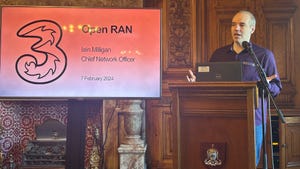EchoStar exploring 'many avenues' to bridge financial gap – CEO
EchoStar CEO Hamid Akhavan said the company is 'not under the gun' to strike deals to fix EchoStar's financial structure. 'The window is long enough for us to make a sound decision' for the long term, he says.

EchoStar/Dish is reviewing paths to improve its dire financial picture following a warning that the company's ability to continue as a "going concern" is at risk if it can't meet looming debt payments.
The company is exploring "many avenues" to meet its debt obligations and ensure it will have funding to complete its 5G network build, EchoStar President and CEO Hamid Akhavan said Friday on its Q4 2023 earnings call.
Execs at EchoStar, which merged with Dish Network late last year, didn't comment specifically on what specific avenues will be taken. Still, Akhavan referenced the company's spectrum and pay-TV assets among the potential options.
If Dish fails at building a successful wireless business, New Street Research estimates that EchoStar has about $58 billion in potential spectrum value, but acknowledges that the company would need FCC and DoJ approval to sell it to the likes of AT&T, Verizon and T-Mobile.
Akhavan said EchoStar has a "value-generating business with a strong potential for growth." But, in the short-term, "we need to provide additional liquidity to fund the growth of our business and address near-term debt maturities," he said.
Dish will use cash on hand and cash flow from operations to pay its March 2024 maturity but will explore other options to fund its November 2024 debt maturity.
Raising funds is also critical to helping EchoStar fulfill its milestone to cover 75% of each of its spectrum license areas with 5G by June 2025. Dish's 5G broadband coverage is currently at about 73%.
"That milestone is certainly within reach if we manage to get our fundraising," Akhavan said.
Not 'under the gun'
But Akhavan stressed that EchoStar is not "under the gun" to decide.
"We're going to take our time and make a transaction that is in the best interest of all parties, the company and all the stakeholders involved," Akhavan said. "I do not find myself and the company under the gun to make a transaction in a rapid fire ... The window is long enough for us to make a sound decision that is a long-term oriented solution for the company. We're not going to compromise by making a quick decision there."
But the company is moving ahead on an operational cost-cutting plan to reduce annual total operating expenses by $1 billion. That plan will come from contributions of all EchoStar businesses, EVP and CFO Paul Orban said.
Coupled with a ramping down of network-related capex spending, EchoStar expects operating cash flow to be positive in 2024.
EchoStar Chairman Charlie Ergen was notably absent from the call. Today is Ergen's birthday, so "we're giving him a day off," Akhavan said. But the new leadership structure at EchoStar following the merger is freeing up Ergen to focus on strategic, longer-term developments for the company, he added.
In 'active discussions'
Orban stressed that the going concern qualification disclosed today is a "technical accounting determination" that does not consider the potential mitigating impact of the various operating and financing plans that the company is pursuing.
"We are in active discussions with numerous parties to secure committed financing to meet our future obligations," he said. EchoStar, Orban added, has "received significant inbound interest from reputable counter-parties looking to provide such financing in various forms and at various positions in our capital structure, all of which we are carefully evaluating."
If EchoStar can secure the necessary financing commitments, "the going concern qualification will be alleviated," he said.
Other nuggets from today's call:
Akhavan said the company is careful to ensure that the pursuit of improving the financial structure does not drag down the business. That said, he likened 2024 as a "transition year" for Dish's mobile business and asked analysts to wait a year before they build a model. 2024 "is not the year that we want put a very static number. This is not a business on a steady state," he said. "The one thing I want to emphasize here and I stand behind – the network is awesome."
Dish's video subscriber declines in Q4 2023 were partly due to the result of disputes with local broadcasters and the cybersecurity incident that hit Dish last year, Gary Schanman, EVP and group president of video services, said. This year should be "less disruptive" for the pay-TV unit, he said.
Dish is also moving ahead on some efficiency projects, including the consolidation of the Dish and Sling TV organizations into one video services team spanning areas such as product, marketing, sales and operations, Schanman said. He also noted that Sling TV is profitable – a rarity in the streaming biz.
About the Author(s)
You May Also Like












